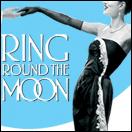Ring Round the Moon
The aristocratic rich and their tediously trivial games are the subject of this revival of Jean Anouilh's 1947 comedy 'L'invitation au Chateau', adapted by Christopher Fry in 1950 and re-titled 'Ring Round The Moon'. Supposedly a satirical play about class, wealth and love, it might have amused or even stirred some blood when it first appeared, but times and audiences have changed and it now seems every bit like a dog that's lost it's teeth. There are some good lines, like 'Money is only worth something to the poor', but any satirical impact the piece still has is obscured when it degenerates into sloppy sentimentality in the final act.
The play is set in what is called 'The Winter Garden' but seems more like a dilapidated greenhouse, or perhaps an outhouse, or even a disused scout hut. The overall effect is rather dreary and run-down, giving the impression that the designer was last in the queue when the budget was dished-out. Either that or he didn't take a big enough sack with him, or had forgotten to do his sums.
Three acts are separated by 2 intervals, which rather stretch tolerance and induce fatigue. I was just fumbling for matches to prop my eyelids open when the final curtain eventually fell. At least an act of this play could be guillotined (in the traditional French manner) without losing any of the plot, and very little of the humour. A ball is to be held at a castle (or chateau, since it's set in France) controlled by the matriarchal Madame Desmortes. One of her rich, handsome nephews, Frédéric, is in love with Diana, the daughter of an even richer and more powerful, Jewish industrialist. Frédéric's twin brother, Hugo, doesn't think it's a very good match and is determined to contrive a rather silly plot to foil the romance. Hugo hires a dancer to attend the ball, dresses her in a stunning evening gown and makes her the talking point of the evening in order to distract Frédéric from Diana. In a sub-plot, the industrialist's mistress is discovered to be sleeping with his private secretary, and the dancer's twittering mother is reunited with an old acquaintance ensures that Hugo's plot is unravelled.
Taking the parts of twin brothers Frederic and Hugo, JJ Feild (yes, that is the correct spelling apparently) has the boyish good looks of Jude Law and the mannerisms of a (very) young Prince Charles. Maybe the latter is appropriate here given the class nature of the material and the views of our heir apparent. Feild's Hugo is as cold-blooded as any reptile, but is prone torants. At the opposite end of the spectrum, his Frédéric a mousey wimp who 't say boo to a goose. Still, Feild is a formidably agile actor, romping round the back of the stage (or under it, perhaps) to appear in seconds as his twin from the opposite wing. He has a place reserved in the Olympic team.
Angela Thorne takes the role of Madame Desmortes whose old-age demands a wheelchair, but hasn't dulled her cynicism. Ms Thorne gets most of the laughs with her jaundiced and wickedly individual view of life.'I can think what I like', she says imperiously, and adds 'The isn't amusing any more. It's time I left.' But her knowledge of human nature - her nephews' nature in particular - leaves us in doubt that her intellect is still as sharp as her wit. Being incapable of reading a play written in French, I can't say how faithful Fry's adaptation is, though I suspect it's lost some of its worth in the process. The title at least seems odd given that it started life as 'Invitation to the castle', which is rather more descriptive the plot.
Mildly amusing and charming though 'Ring Around The Moon' is, I can't help wondering what modern playwrights are doing so terribly wrong if all that producers can whip up for us are revivals - even if they are by famous playwrights. Surely it's time for some new blood to create a new moon for us?
What the popular press had to say.....
PAUL TAYLOR for THE INDEPENDENT says, "Entertaining revival." NICHOLAS DE JONGH for THE EVENING STANDARD says, "Fry's translation, with its flurries of overblown poeticism, cannot conceal the deficiencies of this minor Anouilh." MICHAEL BILLINGTON for THE GUARDIAN says, "This may be unfashionable theatre, but it confirms Anouilh was a master theatrical magician." CHARLES SPENCER for THE DAILY TELEGRAPH says, "A theatrical trifle, perhaps, but one stuffed with good things." BENEDICT NIGHTINGALE for THE TIMES says"Plenty of good, entertaining lines.."
External links to full reviews from popular press
Independent
Guardian
The Times
Daily Telegraph
Originally published on
